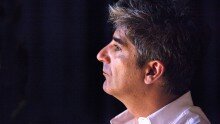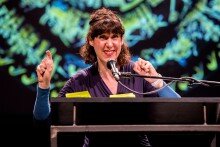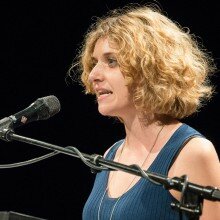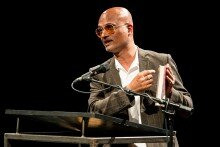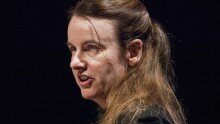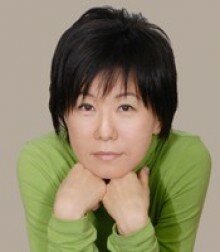
To many Japanese people, Wakako Kaku is known as a lyricist for famous pop singers and the theme songs of Hayao Miyazaki’s animated films, including Spirited Away, for which she won a prestigious Record Taisho award, the Japanese equivalent of the Grammy. Yet to others, Kaku is known as a movie director, theatre producer, essayist, translator, vocal performer, and even a singer, with two solo albums. On her official fan website is a diagram entitled the “Kaku Chart", which consists of a Venn diagram of three circles representing the activities ‘Produce’, ‘Sing’ and ‘Read’. Each of these link to the nine different genres in which she is active. Though seemingly diverse, her ventures knit together to form a universe whose centre of gravity is in fact poetry.
Wakako Kaku began working as a lyricist upon graduating from Waseda University in Tokyo, but remained drawn to poetry as a means of “physical expression” over the years. In 1992 she gave a poetry-reading performance on a small island together with local children; this for her was a turning point. Being married to a Rakugo performer, a comic storyteller in the traditional Japanese fashion (and wholly different to the taciturn potter husband of the narrator in her poem ‘Dear Ceramic Artist’), must also have helped her to realise the physical aspects of poetry: husband and wife have collaborated on various types of vocal performances.
The interplay between poetry and the human body, be it in the form of reciting, singing or dancing, two concepts which were inseparable in the days of purely oral communication, has been somewhat diluted since the introduction of the written language, and has become more or less neglected in contemporary Japanese poetry, which often seems too intellectual to pay attention to corporeal matters. Kaku tries to bring back the body to poetry, not only by performing poetry on stage but also by expressing the physical elements of our being in her writing:
Your skin is there to feel the breeze on your finger as it points to the sky
Your shoulders are there to catch flower petals
Your lips are for kissing
Your cheeks are there to be kissed, isn’t that right?
When each and every one of them
is used just as it is supposed to be
your body comes alive, doesn’t it?
(from ‘Body’)
In this regard, the title of her first poetry collection, Body Becoming Zero, is intriguing: it seems that Kaku searches, through her poetry, for a meeting-point between the body and the spirit in the depth of the human soul, where the boundary between reality and fantasy, or the living and the dead, is also blurred. Kaku’s poems work on our mind similar to the way in which folklore does, and her recitation of them reminds one of traditional storytellers. Two of the poems presented here, ‘Ogre Inside’ and ‘My Dear Ceramic Artist’, best exemplify these characteristics of her poetry.
William I. Elliott and Kazuo Kawamura translated ‘Applause’ and Takako Lento translated the other poems featured here. We also publish here an essay by Takako Lento in which she discusses ‘Ogre Inside’ and ‘My Dear Ceramic Artist’ in particular. Written in the spirit of the traditional storytelling, these poems are filled with everyday details of modern Japanese life, so Lento’s essay should be helpful as a readers’ guide.
Bibliography
Poetry
Zero ni naru karada (Body Becoming Zero), Tokuma Shoten, Tokyo, 2002
Umi no youna otona ni naru (I Will Be a Grown-up Like the Sea), Rironsha, Tokyo, 2007
Essays
Seiten hakujitsu (Blue Sky White Day), Shohbunsha, Tokyo, 2004
Children’s books
Neh (You know . . . ), co-authored with Shuntaro Tanikawa and Akira Sato, Froebel Kan, Tokyo, 2008
Hugtime (translation from English, originally written by Patrick McDonnell), Asunaro, Tokyo, 2008
Music album
Aozora ichigou (Bluesky #1), GT Music, Tokyo, 2004
Links
kaku-wakako.com Wakako Kaku’s official fan site
official website of Yah Chayka! (I, Seagull), a film Wakako Kaku co-directed with poet Shuntaro Tanikawa



